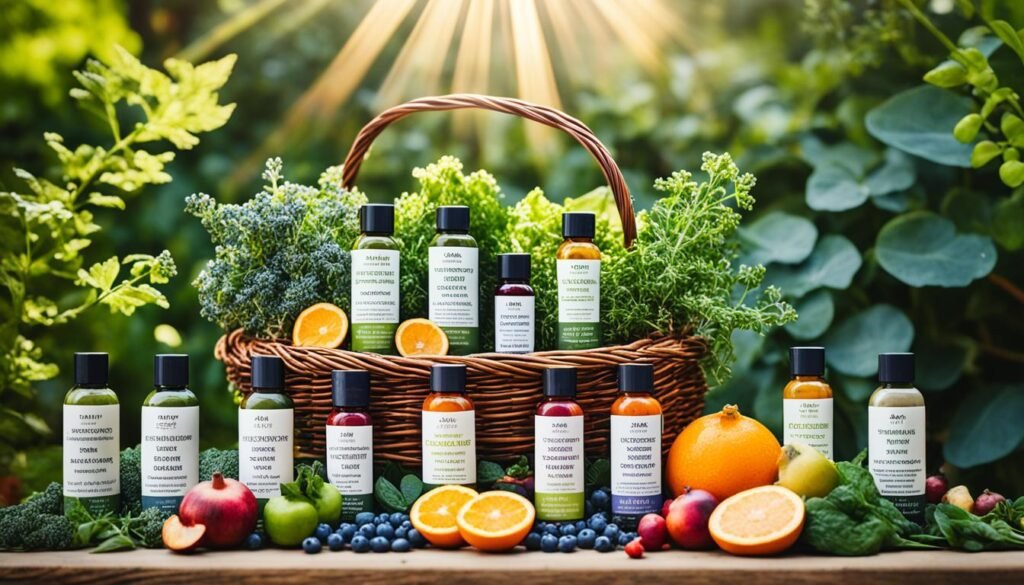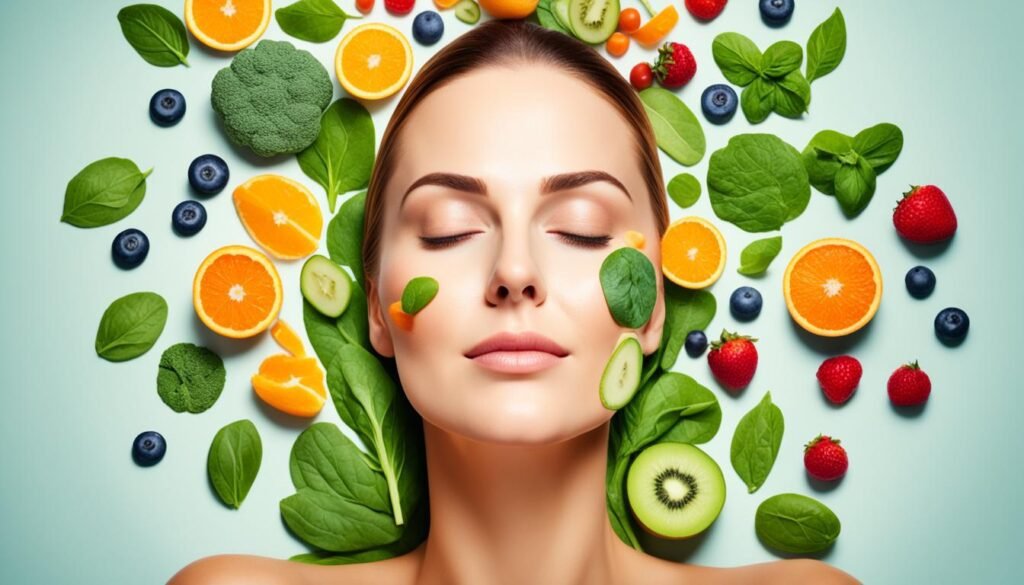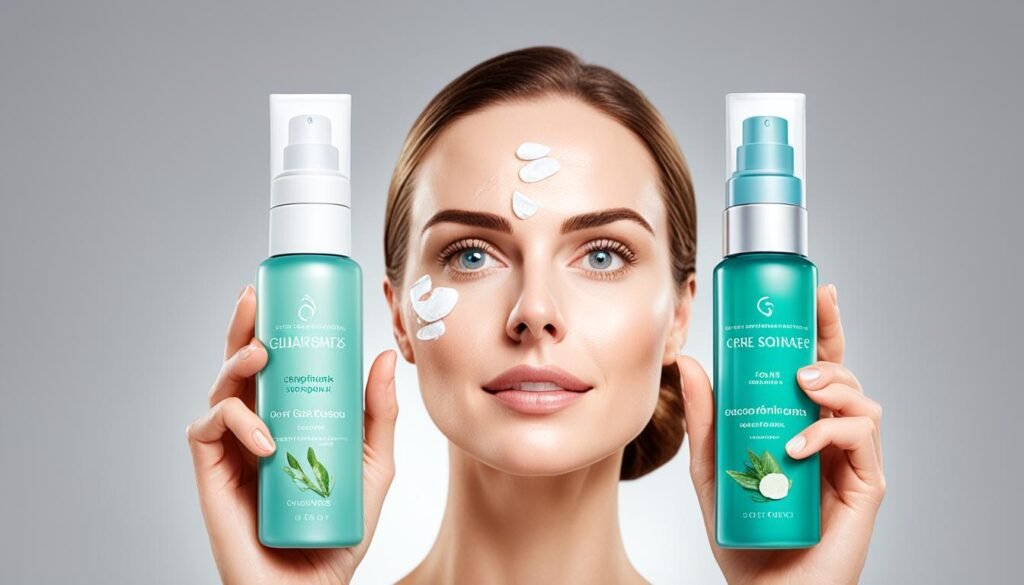Did you know that antioxidants can work wonders for your skin?
Antioxidants, found in various natural sources, have been found to prevent or slow down aging and cell damage. These powerful substances, including vitamins A, C, and E, selenium, zinc, carotenoids, flavonoids, and glutathione, can be found in fruits, vegetables, and dietary supplements. Research indicates that antioxidants can protect the skin from harmful UV radiation, improve hydration, stimulate collagen and elastin production, reduce wrinkles and pigmentation, and support the healing process. Moreover, antioxidants may even have a beneficial role in preventing skin conditions such as vitiligo, atopic dermatitis, and acne.
Key Takeaways:
- Antioxidants can prevent or slow down skin aging and cell damage.
- Vitamins A, C, and E, selenium, zinc, carotenoids, flavonoids, and glutathione are natural sources of antioxidants.
- Antioxidants protect the skin from UV radiation, improve hydration, reduce wrinkles, and support healing processes.
- Antioxidants may have a beneficial role in preventing skin conditions like vitiligo, atopic dermatitis, and acne.
- It is important to incorporate antioxidant-rich foods and skincare products into your routine for healthy and rejuvenated skin.
The Role of Antioxidants in Skin Health and Aging
Antioxidants play a crucial role in maintaining skin health and combating the signs of aging. They work by neutralizing free radicals and oxidative stress, which are major factors in skin aging and disease development. Oxidative stress is caused by environmental sources such as pollution, tobacco, alcohol, and UV radiation.
Antioxidants, both synthetic and natural, can help protect the skin from DNA damage, improve hydration, stimulate collagen and elastin production, reduce wrinkles and pigmentation, support healing processes, and reduce inflammation.
It is believed that supplying the skin with essential nutrients through a varied diet and antioxidant-rich skincare products can be an effective and cost-efficient way to improve skin condition and achieve a more youthful complexion. Additionally, antioxidant supplements can also contribute to skin rejuvenation, but it is important to consult with a healthcare professional before taking any supplements to avoid interactions with medications.
Protect your skin from aging and keep it looking youthful with the power of antioxidants.
Whether it’s through a nutritious diet or skincare products, antioxidants can help maintain the health and appearance of your skin.
“Using antioxidants in your skincare routine can help protect your skin from the damaging effects of free radicals and oxidative stress. It’s like giving your skin an extra layer of defense against aging and other skin concerns.”
When it comes to skincare, there are various effective antioxidants available that can address different skin issues. Vitamin C, for example, is known for its brightening and collagen-boosting properties, making it a popular choice for achieving a youthful glow.
But it’s not just topical antioxidants that can make a difference. A well-rounded, antioxidant-rich diet can also support skin health from within. Including foods such as berries, leafy greens, and nuts in your meals can provide your body with the necessary nutrients to promote glowing skin.
However, it’s important to note that while antioxidants offer numerous benefits, they are not a magic solution for all skin concerns. Skincare results vary from person to person, and it’s essential to find the right combination of products and practices that work for your unique skin type and concerns.
To unlock the potential of antioxidants and give your skin the care it deserves, consult with a skincare professional who can guide you in choosing the most effective antioxidants and developing a personalized skincare routine.
Antioxidants in Skincare Products: Choosing the Right Options

When it comes to skincare, incorporating antioxidants into your routine can provide numerous benefits for your skin. Many skincare products on the market today contain antioxidant-rich ingredients such as retinoids, vitamin C, or vitamin E. These antioxidants can help to protect and rejuvenate your skin, giving you a radiant complexion.
However, it is important to choose the right skincare products that suit your individual needs and skin type. Taking precautions when using skincare products with antioxidants is crucial to avoid any potential skin irritations or adverse reactions.
Here are some key considerations to keep in mind when selecting antioxidant-rich skincare products:
- Consider your skin type: Whether you have sensitive, normal, dry, oily, or combination skin, it is important to choose products that meet the specific needs of your skin type.
- Read product labels: Take the time to carefully read the labels of skincare products to ensure that the antioxidant ingredients are suitable for your skin and address your specific concerns.
- Avoid skin irritants: Be cautious of skincare products that contain potential skin irritants, such as fragrances or certain preservatives. Opt for products that are labeled as hypoallergenic or formulated for sensitive skin.
- Wear sunscreen: Regardless of the skincare products you use, it is important to wear sunscreen daily with an SPF of 30 or higher on exposed skin. This will provide an additional layer of protection against harmful UV rays.
One popular antioxidant ingredient found in skincare products is retinoids, which are derivatives of vitamin A. Retinoids can improve skin tone, pigmentation, and texture. However, they may cause dryness and sensitivity to sun damage. To counteract this, it is important to use sunscreen when incorporating retinoid products into your skincare routine. Pregnant individuals should avoid retinoid products, and those with hormonal acne should consult a dermatologist before considering their use.
By following these precautions and selecting the right antioxidant-rich skincare products for your skin, you can enhance the health and appearance of your skin while minimizing potential risk.
Remember, always consult with a dermatologist or skincare professional for personalized advice and recommendations tailored to your specific skin concerns and needs.
Table: Common Antioxidant Ingredients in Skincare Products
| Antioxidant Ingredient | Main Benefits | Recommended For |
|---|---|---|
| Retinoids (vitamin A derivatives) | Improves skin tone, pigmentation, and texture | Most skin types; caution for pregnant individuals and those with hormonal acne |
| Vitamin C | Protects against sun damage, replenishes vitamin E levels, improves overall skin appearance | All skin types |
| Vitamin E | Moisturizes and nourishes the skin, reduces inflammation | All skin types |
As you can see, choosing the right antioxidant-rich skincare products is essential for optimizing the benefits to your skin. By considering your skin type, reading product labels, avoiding skin irritants, and wearing sunscreen, you can ensure that your skincare routine is tailored to your needs and promotes healthy, vibrant skin.
Antioxidants in Foods and Supplements: Essential Nutrients for Skin Health
To maintain healthy skin, incorporating antioxidants into your diet is essential. Natural sources of antioxidants can be found in a variety of fruits, vegetables, and dietary supplements.
Foods that are rich in antioxidants include pomegranates, apples, lemons, dried fruits, kale, broccoli, chilis, olives, beets, peppers, gooseberries, bilberries, blackberries, blueberries, coffee, green tea, red wine, cacao, and herbs and spices. These antioxidant-rich foods provide a wide range of benefits for the skin.
Additionally, dietary supplements can be taken to boost antioxidant levels in the body. However, it is important to consult with a healthcare professional before taking any supplements, as they can interact with medications and have potential side effects.
By maintaining a balanced and varied diet that includes antioxidant-rich foods, you can provide your body with the necessary nutrients to support skin health. Including these antioxidants in your diet can contribute to achieving a radiant complexion and overall skin rejuvenation.
The Role of Antioxidants in Protecting the Skin from UV Radiation

UV radiation from the sun is a major factor in skin aging and the development of skin conditions. Antioxidants have been found to help protect the skin from the damaging effects of UV radiation. They can reduce DNA damage caused by UV light, improve hydration, stimulate the production of collagen and elastin, and reduce the appearance of wrinkles and pigmentation. Antioxidants such as carotenoids, zinc, and vitamin E have been specifically linked to protecting the skin from UV damage.
While antioxidants provide some level of protection against UV radiation, it is essential to note that they should not replace the use of sunscreen. Sunscreen remains the most effective method of protecting the skin from harmful UV rays.
“Applying antioxidants to the skin can help mitigate the harmful effects of UV radiation. However, sunscreen remains the gold standard for comprehensive UV protection.”
| Antioxidant | Benefits for UV Protection |
|---|---|
| Carotenoids | Neutralize free radicals generated by UV radiation |
| Zinc | Forms a physical barrier on the skin to reflect and block UV rays |
| Vitamin E | Protects cell membranes from UV-induced damage |
Antioxidants and Skin Conditions: Potential Benefits and Areas for Further Research
Antioxidants have shown promising potential in the prevention and management of various skin conditions. Research has observed lower levels of vitamin E in patients with vitiligo, atopic dermatitis, and acne, indicating a potential link between antioxidant deficiency and these skin diseases. However, further studies are needed to thoroughly evaluate the effectiveness of vitamin E in improving these conditions.
Another review suggests that antioxidants may have a beneficial role in counteracting oxidative stress in psoriasis, a chronic skin condition characterized by red, itchy, and scaly patches. Oxidative stress, caused by an imbalance between antioxidants and harmful free radicals, is thought to contribute to the development and progression of psoriasis. Although preliminary research is promising, additional studies are required to determine the optimal use of antioxidants in managing psoriasis and other related skin diseases.
These findings highlight the potential therapeutic benefits of antioxidants in addressing specific skin conditions. However, further research is necessary to fully understand their mechanisms of action, optimal dosage, and efficacy in treating different skin diseases. The exploration of antioxidants as a potential treatment avenue for various skin conditions presents an exciting area for future research.
| Skin Condition | Potential Benefits of Antioxidants |
|---|---|
| Vitiligo | Improvement of antioxidant levels to counterbalance oxidative stress |
| Atopic Dermatitis | Possibly reducing inflammation and promoting skin barrier function |
| Acne | Potential role in reducing inflammation and enhancing skin healing |
| Psoriasis | Counteracting oxidative stress and potentially alleviating symptoms |
Table: Potential benefits of antioxidants for various skin conditions.
Topical Application of Antioxidants: Vitamin C and its Benefits for the Skin

Vitamin C is a highly sought-after antioxidant in the world of skincare. It offers a multitude of benefits for the skin and is widely recognized for its anti-aging and anti-pigmentation properties. As the most abundant antioxidant in human skin, vitamin C plays a crucial role in maintaining skin health and radiance.
When topically applied, vitamin C can provide the skin with a range of advantages. One of its primary benefits is its ability to protect the skin from the harmful effects of sun exposure. As a powerful antioxidant, vitamin C neutralizes free radicals generated by UV radiation, preventing damage to the skin cells and reducing the risk of sunburn and long-term sun damage.
Additionally, vitamin C helps replenish the levels of vitamin E in the skin. Vitamin E is another potent antioxidant that plays a vital role in protecting the skin from oxidative stress and fighting against aging. By maintaining adequate levels of vitamin E, topical vitamin C promotes overall skin health and enhances the skin’s natural defense mechanisms.
The benefits of topical vitamin C go beyond protection. This antioxidant has also been shown to improve the overall appearance of the skin. Vitamin C stimulates collagen synthesis, a key process for maintaining skin elasticity and reducing the appearance of fine lines and wrinkles. Furthermore, it can help fade hyperpigmentation, even out skin tone, and promote a more youthful complexion.
It’s important to note that while oral supplements of vitamin C offer essential nutrients for overall health, their availability and effectiveness in reaching the skin may be limited. That’s why topical vitamin C products, such as serums and creams, are often recommended for optimal results when targeting specific skin concerns and reaping the benefits of this powerful antioxidant.
Benefits of Topical Vitamin C for the Skin
| Benefits | Description |
|---|---|
| Protection from sun damage | Neutralizes free radicals generated by UV radiation and reduces the risk of sunburn and long-term sun damage |
| Replenishes vitamin E | Maintains adequate levels of vitamin E, supporting overall skin health and enhancing natural defense mechanisms |
| Stimulates collagen synthesis | Improves skin elasticity, reduces the appearance of fine lines and wrinkles |
| Fades hyperpigmentation | Helps even out skin tone and reduce the appearance of dark spots |
| Promotes a youthful complexion | Enhances overall skin radiance and vitality |
When incorporating topical vitamin C into your skincare routine, it’s essential to choose products with stable forms of vitamin C, such as ascorbic acid or its derivatives, as they provide optimal efficacy. Additionally, it’s recommended to start with a lower concentration of vitamin C and gradually increase as tolerated, as some individuals with sensitive skin may experience mild irritation initially.
By harnessing the power of topical vitamin C, you can enhance your skincare routine and unlock the remarkable benefits this antioxidant offers for maintaining a healthy, vibrant complexion.
The Importance of Understanding Your Skin Type and Choosing the Right Skincare Products

When it comes to skincare, one size does not fit all. Understanding your skin type is the foundation for establishing an effective skincare routine and selecting the right products for your specific needs. Whether you have sensitive, normal, dry, oily, combination, or other skin types, each requires a tailored approach. Using the wrong skincare products can lead to irritation and other adverse effects, compromising the health and appearance of your skin.
One of the key considerations in selecting skincare products is to wear sunscreen with SPF 30 or higher on exposed skin, regardless of your skin type. Sun protection is essential in preventing sun damage and premature aging.
For individuals with sensitive or allergy-prone skin, extra caution is necessary. It is advisable to consult with a dermatologist to determine which skincare products are suitable and safe for your unique skin condition.
“Choosing the right skincare products starts with understanding your skin type and its specific needs.”
Retinoid products, renowned for their anti-aging benefits, require careful usage. Pregnant individuals or those with hormonal acne should seek professional guidance from a dermatologist before incorporating retinoids into their skincare routine.
Choosing the right skincare products involves reading product labels and identifying suitable ingredients for your skin type. Look for products formulated specifically for your skin concerns and avoid potential irritants.
Table: Common Skin Types and Key Considerations
| Skin Type | Key Considerations |
|---|---|
| Sensitive | Choose gentle products, free from fragrances and harsh chemicals. Patch-test new products before full application. |
| Normal | Opt for products that maintain skin balance and provide hydration. |
| Dry | Look for moisturizing products that provide deep hydration. Avoid products that can further dry out the skin. |
| Oily | Choose oil-free and non-comedogenic products to prevent clogged pores. Look for ingredients that regulate sebum production. |
| Combination | Address specific concerns of each area. Use different products for the oily T-zone and drier areas. |
Incorporate specialized skincare products targeting your skin type to maximize their effectiveness. From cleansers and toners to moisturizers and serums, there are tailored options available for every skin type and concern.
Remember, achieving healthy, glowing skin starts with understanding your skin type and its specific needs. By selecting the right skincare products and using them consistently, you can elevate your skincare routine to new levels of effectiveness and enhance the overall health and appearance of your skin.
Takeaway:
- Understanding your skin type is crucial for establishing an effective skincare routine.
- Choose skincare products that align with your skin type and address your specific needs.
- Consult with a dermatologist for personalized skincare recommendations if needed.
Antioxidants as a Key Component in Skincare: Efficacy and Cautionary Notes

Skincare products that contain antioxidants can be highly effective in improving the appearance and health of the skin. The inclusion of antioxidants helps combat free radicals and oxidative stress, key factors in skin aging and damage. Antioxidants have been shown to protect the skin from harmful UV radiation, improve hydration, stimulate collagen production, reduce wrinkles and pigmentation, and support the healing process.
However, it is important to note that the efficacy of antioxidant-rich skincare products can vary. While research indicates their potential benefits, evidence regarding their impact on skin cells is not consistent. Some studies suggest that the use of high doses of antioxidants for prolonged periods may have adverse effects, highlighting the need for caution and medical advice.
Additionally, it’s important to recognize that individuals may react differently to skincare products with antioxidants. Some may experience skin irritation or other adverse reactions. Therefore, it is crucial to choose skincare products based on your skin type and read product labels to ensure compatibility. If any adverse reactions occur, it is recommended to discontinue use and consult a dermatologist.
Efficacy of Antioxidants in Skincare
While the efficacy of antioxidants in skincare products is not definitive, certain antioxidants such as vitamin C, vitamin E, and resveratrol have shown promising results in improving various aspects of skin health. These antioxidants can protect the skin from environmental damage, promote collagen synthesis, and enhance overall skin texture.
However, it is worth noting that the effectiveness of antioxidants in skincare can depend on factors such as formulation, concentration, stability, and penetration into the skin. The quality and combination of antioxidants in a product can also impact its efficacy.
Cautionary Notes when Using Skincare Products with Antioxidants
When incorporating skincare products with antioxidants into your routine, it is essential to be mindful of a few precautions:
- Choose products suited to your skin type: Different skin types have varying sensitivities and needs. It’s important to select skincare products that are compatible with your specific skin type to avoid potential adverse reactions. Factors such as oily skin, dryness, or sensitivity should be taken into account when making choices.
- Read product labels: Carefully read product labels to ensure that the antioxidant ingredients in the skincare product are suitable for your skin. Look for details on concentration and compatibility.
- Discontinue use if adverse reactions occur: If you experience skin irritation, redness, or other adverse reactions while using skincare products with antioxidants, it is important to discontinue use immediately and consult a dermatologist for guidance.
By following these cautionary measures and choosing skincare products that align with your skin type and needs, you can maximize the benefits of antioxidants in your skincare routine while minimizing potential risks.
The Role of Antioxidants in Photoprotection and Skin Aging Prevention

Antioxidants play a crucial role in protecting the skin from the damaging effects of UV radiation and preventing skin aging. As we know, UV radiation is a primary cause of premature skin aging, including wrinkles, fine lines, and pigmentation. Incorporating antioxidants into your skincare routine can help combat these effects and promote a youthful complexion.
So, how exactly do antioxidants work in photoprotection? They act by reducing oxidative stress and neutralizing free radicals generated by UV radiation. Free radicals are highly reactive molecules that can damage the DNA, proteins, and lipids in our skin cells, leading to cellular dysfunction and accelerated aging. By neutralizing these free radicals, antioxidants help mitigate DNA damage, maintain skin hydration, stimulate the production of collagen and elastin, and reduce the appearance of wrinkles and pigmentation.
Evidence suggests that a combination of antioxidants and sunscreen provides the most comprehensive protection against UV radiation. While sunscreen forms a physical barrier to block and absorb harmful UV rays, antioxidants act on a cellular level to prevent and repair the damage caused by free radicals. Therefore, incorporating antioxidant-rich skincare products and a broad-spectrum sunscreen with an SPF of 30 or higher can offer enhanced protection against UV-induced skin aging.
Furthermore, antioxidants have additional benefits beyond photoprotection. They support overall skin healing, reduce inflammation, and improve skin texture and tone. By promoting collagen and elastin synthesis, antioxidants can help maintain the structural integrity of the skin, resulting in a smoother and firmer appearance.
It’s important to note that while antioxidants play a significant role in photoprotection and skin aging prevention, they should not replace the use of sunscreen. Sunscreen remains the most effective method of protecting the skin from UV radiation. However, incorporating antioxidants into your skincare routine can complement the protection provided by sunscreen, enhancing your efforts to maintain youthful, healthy-looking skin.
| Benefits of Antioxidants in Photoprotection and Skin Aging Prevention | Examples of Antioxidant-Rich Foods |
|---|---|
|
|
Conclusion
Natural antioxidants are essential for skin health and rejuvenation. They offer a wide range of benefits, including protection against UV radiation, prevention of oxidative stress, stimulation of collagen and elastin production, reduction of wrinkles and pigmentation, and support for healing and hydration. These powerful compounds can be obtained from various sources, such as fruits, vegetables, dietary supplements, and skincare products.
However, it’s important to note that further research is still needed to fully understand the mechanisms of antioxidants and their potential interactions and adverse effects. While incorporating natural antioxidants into your skincare routine and maintaining a healthy diet with antioxidant-rich foods is beneficial, it is recommended to consult with a healthcare professional or dermatologist for personalized advice.
By harnessing the power of natural antioxidants, you can support your skin health and achieve a radiant, youthful complexion. Whether it’s through eating antioxidant-rich foods or using skincare products that contain these beneficial compounds, incorporating antioxidants into your daily routine is a simple and effective way to enhance your skin’s well-being.
FAQ
What are the benefits of natural antioxidants for the skin?
Natural antioxidants provide numerous benefits for the skin, including preventing aging and cell damage, protecting against UV radiation, improving hydration, stimulating collagen and elastin production, reducing wrinkles and pigmentation, and supporting overall skin healing and hydration.
How do antioxidants contribute to youthful skin and effective skincare?
Antioxidants play a crucial role in maintaining skin health and combating the signs of aging. They neutralize free radicals and oxidative stress, protect against DNA damage, and reduce inflammation, which can help improve the overall appearance and health of the skin.
How can I incorporate antioxidants into my skincare routine?
You can incorporate antioxidants into your skincare routine by choosing skincare products that contain antioxidant ingredients such as retinoids, vitamin C, or vitamin E. It is important to consider your skin type and read product labels to ensure compatibility and avoid any adverse reactions.
What are the best natural sources of antioxidants for the skin?
Natural sources of antioxidants for the skin include fruits (such as pomegranates, apples, and berries), vegetables (like kale and broccoli), coffee, green tea, herbs/spices, and certain beverages like red wine. A balanced and varied diet with antioxidant-rich foods can provide the necessary nutrients to support skin health.
How do antioxidants protect the skin from UV radiation?
Antioxidants help protect the skin from the damaging effects of UV radiation by reducing DNA damage, improving hydration, stimulating collagen and elastin production, and reducing the appearance of wrinkles and pigmentation. However, it is important to note that antioxidants should not replace sunscreen, as sunscreen is the most effective method of protecting the skin from harmful UV rays.
What are the potential benefits of antioxidants for skin conditions?
Research suggests that antioxidants may play a beneficial role in addressing certain skin conditions, such as vitiligo, atopic dermatitis, acne, and psoriasis. However, further research is needed to fully evaluate their effectiveness and optimal use in managing these skin diseases.
What are the benefits of topical vitamin C for the skin?
Topical application of vitamin C can help protect the skin from sun exposure, replenish vitamin E levels, improve skin tone and pigmentation, and enhance overall skin appearance. It is important to note that oral supplements of vitamin C may have limited availability and effectiveness in reaching the skin, which is why topical vitamin C products are often recommended for optimal results.
How important is it to understand my skin type and choose the right skincare products?
Understanding your skin type is essential in establishing an effective skincare routine and choosing the right products. Different skin types have specific needs, and using the wrong skincare products can lead to irritation or adverse effects. It is important to consider your skin type and read product labels to ensure compatibility with your individual needs.
Are all skincare products with antioxidants equally effective?
The efficacy of antioxidant-rich skincare products can vary, and evidence regarding their impact on skin cells is not consistent. It is important to choose skincare products based on your skin type, read product labels for compatibility, and discontinue use if any adverse reactions occur.
Do antioxidants have a role in preventing skin aging and photoprotection?
Yes, antioxidants have been studied for their role in preventing skin aging and protecting against UV radiation. By reducing oxidative stress and neutralizing free radicals, antioxidants can help mitigate DNA damage, improve hydration, stimulate collagen and elastin production, and reduce the appearance of wrinkles and pigmentation.




